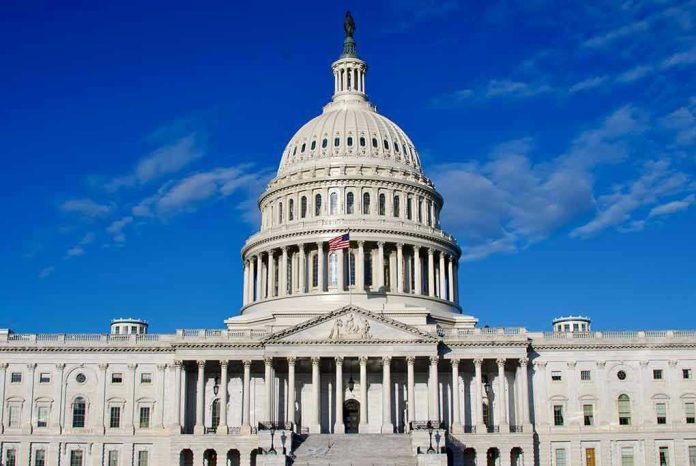
Phil Mickelson’s one-line social media post on “No Kings” day sent shockwaves through the world of sports and politics, using sarcasm to land a double-barreled critique of both Biden’s executive actions and the protest movement itself.
Story Snapshot
- Phil Mickelson mocked “No Kings” protests and Biden’s use of autopen for executive orders in a viral post.
- His message amplified the intersection of sports celebrity and political discourse in America.
- The protests targeted Trump’s perceived authoritarianism, but Mickelson flipped the script to critique Biden.
- The event reignited debate on athletes’ roles in politics and the power of social media platforms.
Mickelson’s Social Media Volley Reverberates Beyond the Fairway
Phil Mickelson, not content to let the “No Kings” protests pass quietly, leveraged his massive following to take a stand. On October 18, 2025, as cities across America—and even London—buzzed with demonstrators rallying against what they saw as creeping authoritarianism in Trump-era politics, Mickelson’s post on X (formerly Twitter) landed with the precision of a well-placed iron shot. Instead of supporting the movement’s anti-Trump message, Mickelson employed biting sarcasm to lampoon both the protesters and President Biden’s executive decisions, especially the use of autopen to sign pardons and orders. His timing was unmistakable, his intent clear: challenge the dominant narrative and stoke the ever-simmering culture war.
Mickelson’s message—“On this special day as we all gather to fight against blanket auto pen pardons and executive orders, lawlessness, and stealing citizen’s resources for illegal non citizens, I believe it has worked!! That is no longer happening so great job everyone”—invited readers to question the efficacy and sincerity of the protests. By framing Biden’s executive actions as “lawlessness” and resource theft, he not only challenged the administration’s policies but also highlighted the irony of protesting executive overreach while, in his view, ignoring similar actions by the current president. Mickelson’s support for Trump, long chronicled in media coverage, gave his words extra weight among conservative audiences, while infuriating critics who saw his intervention as both misinformed and provocative.
Protest Origins and an Unintended Spotlight
The “No Kings” protests did not emerge overnight. Their roots trace to years of escalating rhetoric about executive power, with organizers invoking America’s foundational rejection of monarchy to oppose what they described as dictatorial behavior in Republican politics. The slogan “No Kings” was chosen to galvanize opposition against Trump-style leadership and to warn against unchecked presidential authority. Yet, the protests’ very success—drawing millions to major urban centers and even prompting National Guard mobilization in Virginia—created a national stage for counter-narratives like Mickelson’s. While protesters chanted against Trump, Mickelson used the moment to highlight what he and many conservatives see as similar, if subtler, overreaches by Biden. His critique of the autopen—a symbol of executive expediency—became a flashpoint for debates about legitimacy, transparency, and the limits of presidential power.
Political polarization forms the backdrop to this drama. The government shutdown at the time added urgency and acrimony, with both sides accusing the other of distraction and mismanagement. Republican leaders dismissed the protests as theater, while Democratic organizers insisted their movement was a necessary bulwark against tyranny. In this climate, celebrity interventions—especially those as pointed as Mickelson’s—don’t just add fuel to the fire; they reshape the contours of the debate, inviting new audiences to engage and react.
Celebrity, Influence, and the Arena of Public Opinion
Phil Mickelson’s status as a sporting icon made his words echo far beyond the echo chambers of political Twitter. Over decades, athletes have become increasingly vocal on national issues, but Mickelson’s blend of sardonic humor and pointed critique struck a chord—and a nerve. For conservative fans, he embodied the courage to “speak truth to power,” reinforcing their skepticism of mainstream narratives. For opponents, he was leveraging fame to misrepresent the intent of the protests and distract from substantive policy debates. The result: a digital firestorm, with Mickelson trending across platforms, his post dissected in newsrooms and living rooms alike.
Media outlets from The Washington Times to sports sites like OutKick dissected the post, while social media channels erupted with both praise and condemnation. The deeper irony—Mickelson using a protest meant to challenge Trump as an opportunity to target Biden—was not lost on observers. In the short term, his comments intensified polarization and spotlighted the ever-blurring line between sports and politics. In the long term, they raised questions about the responsibilities of public figures whose words can sway millions, for better or worse.
Debate, Division, and the Road Ahead
The aftermath of Mickelson’s post continues to unfold. While he has not issued further statements, the episode has become a Rorschach test for a divided America. Supporters celebrate his willingness to defy the prevailing winds of political correctness, while critics decry what they see as a calculated stunt to muddy the waters. The protests themselves, largely peaceful but heavily policed, faded as a news event, but the questions they raised—about executive authority, the role of protest, and the power of celebrity voices—remain unresolved.
What is clear is that the intersection of sports, politics, and social media is only growing more consequential. Mickelson’s post may have been one line, but its reverberations will echo through future debates over who gets to shape the narrative—and who gets to call out the “kings” of American politics, regardless of which side of the aisle they sit.









